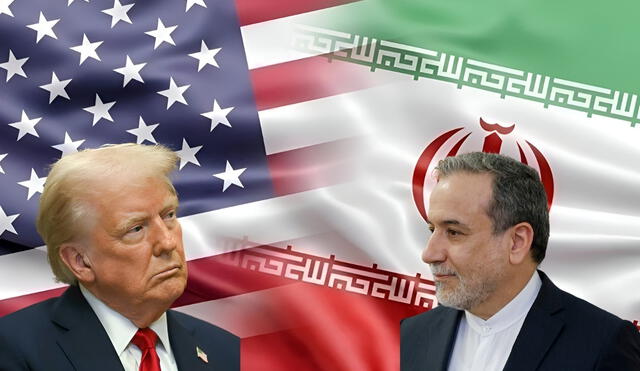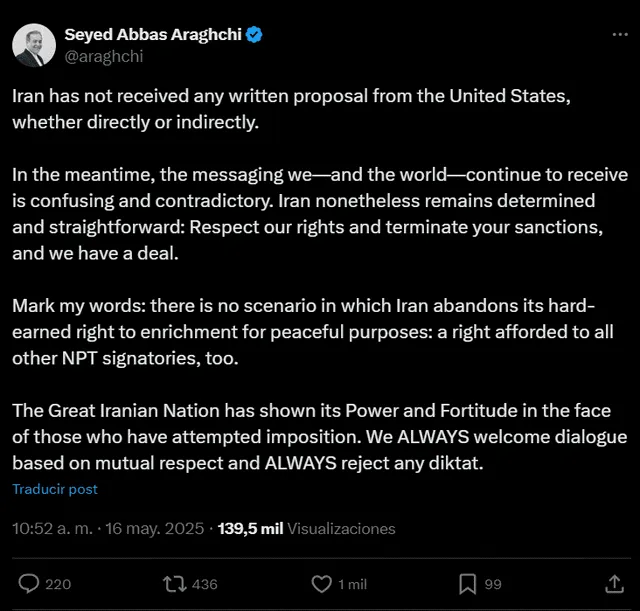Trump claims U.S. has presented nuclear deal proposal to Iran: 'They’re moving fast or something bad will happen'
In a bold statement, Trump reveals the U.S. has made a move on a new nuclear deal with Iran—warning that swift action is needed, or serious consequences could follow in a rapidly escalating standoff.

On the flight back to Washington from Abu Dhabi, President Donald Trump announced that Iran has received a concrete proposal from the U.S. to settle the nuclear dispute. He stated that it is urgent that Iran act ("They have a proposal, and more importantly they know they have to act quickly or something bad is going to happen"). Trump's words emphasized the administration's need to act fast to avoid what they label "bad behavior." The proposal addresses concerns over Iran's nuclear program and calls for a peaceful, negotiated resolution to the continued tensions. Information about the proposal has not been made public.
In response, Iranian officials including Deputy Foreign Minister Abbas Araghchi insisted that they had not received a written proposal from the U.S., whether directly or through intermediaries like Oman. Araghchi reiterated Iran's right to enrich uranium for peaceful purposes in accordance with the Nuclear Non-Proliferation Treaty, and he criticized the U.S. for sending contradictory messages to Iran. He stated that "Iran is not going to give up its major plans of nuclear rights." The contradictory public comments represent a significant level of mistrust between the two states, while Iran maintains its position despite national pressure.
U.S. Pushes nuclear limits on Iran amid sanctions and tense talks mediated by Oman
The U.S. plan purportedly has limitations on Iran's uranium enrichment times and mechanisms for international oversight. Negotiations have been assisted with the facilitating and mediating of the Omani Foreign Minister, Badr al-Busaidi. While the U.S. hopes to limit Iran's nuclear capabilities, Iran is looking for the removal of economic sanctions as a condition for an agreement. The talks have been described as tense but continuing; both parties appear to be motivated to avoid another war.
The U.S. has recently applied new sanctions against Iran in critical areas of its economy. Secretary of State Marco Rubio states that this is to prevent Iran's acquisition of nuclear weapons and to pressure Tehran to change. The sanctions have caused further tensions and complications in diplomatic engagement. Iran has condemned the sanctions as unfair and unproductive. The global community seems divided on the efficacy of sanctions.
Trump’s Middle East Tour strengthens U.S. alliances to counter Iran amid nuclear tensions
President Trump's first trip to the Middle East, which included funding trips to Saudi Arabia, Qatar, and the United Arab Emirates, proved to be hugely successful in terms of economic and defense agreements with the nation, which amounted to hundreds of billions of dollars in renewed and new U.S.-allied defense and economic ties with regional partners. The Trump administration viewed these as partnerships in terms of countering Iran's influence. The tour also continuing to articulate the U.S. case on Iran's nuclear program to build support among regional partners. Regional leaders offered varying degrees of support for U.S. policies.

Deputy Foreign Minister Abbas Araghchi denies receiving a U.S. proposal, affirming Iran’s right to peaceful nuclear enrichment. Photo: Seyed Abbas Araghchi X account
As these situations continue to develop, it is watching the international community closely and hoping for a peaceful transition. The eventual conclusion of these negotiations will have consequences for regional stability and global security. Both the U.S. and Iran are dealing with internal and external factors that shape their negotiating positions. The way forward remains unclear, as either further diplomacy or confrontation could remain on the table through the fall. Analysts similarly emphasize the importance of maintaining diplomatic conversations to minimize escalation.













